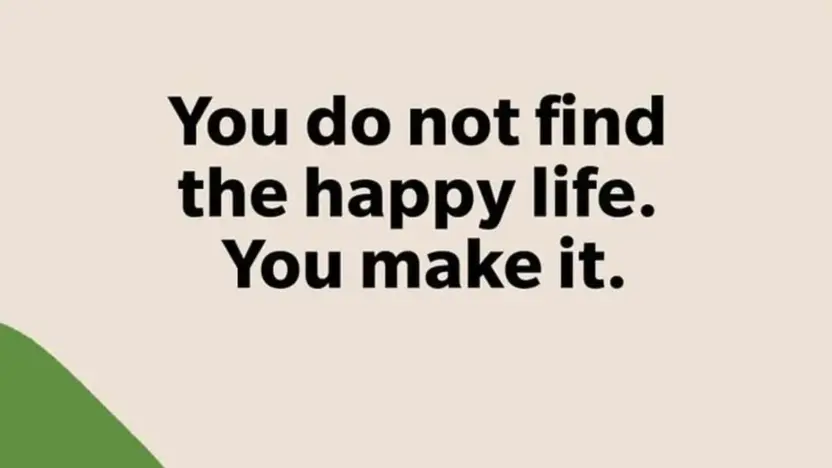The quote, “You do not find the happy life. You make it,” serves as a powerful reminder of the active role we must play in crafting our own happiness. This statement, steeped in wisdom, suggests that happiness is not a serendipitous element we stumble upon, but a deliberate construction, a masterpiece we paint with the brushstrokes of our daily choices, attitudes, and actions. This blog post delves into the multifaceted dimensions of this quote, exploring how it serves as a guide for those seeking fulfillment and joy in their lives.
The Misconception of Happiness as a Destination
Many of us fall into the trap of perceiving happiness as a destination—a milestone or achievement that, once reached, will grant us perpetual satisfaction. We chase after the ideal job, relationship, or financial status, believing that happiness lies just beyond the next achievement. However, this quote challenges this notion by emphasizing that happiness is not something to be found or arrived at; it is not lurking in the external world, waiting to be discovered. Instead, happiness is about the journey, the process, and the making of it amidst the nuances of everyday life.
The Creative Process of Building Happiness
The operative word “make” in the quote suggests an ongoing, creative process. Just as an artist creates a piece of art, we are called to be architects of our own joy. This involves a proactive stance—selecting the materials of our lives, such as relationships, work, and hobbies, with intention and purpose. It also means sculpting our inner landscape, cultivating qualities like gratitude, resilience, and kindness, which are essential ingredients for a fulfilling life.
The Role of Personal Responsibility
At the heart of this quote is the theme of personal responsibility. It propels us to take ownership of our happiness, rather than attributing our state of well-being to external factors or other people. This perspective empowers us, as it places the pen of our life’s narrative firmly in our hands. We are encouraged to make choices and engage in behaviors that align with our values and aspirations, understanding that our happiness is a consequence of these decisions.

The Significance of Mindset and Attitude
The quote also underscores the significance of mindset and attitude in the crafting of a happy life. It suggests that how we perceive our circumstances, how we respond to challenges, and the narrative we tell ourselves about our lives greatly influence our happiness. Adopting a positive outlook, focusing on solutions rather than problems, and embracing change and growth as opportunities can transform our experience of life.
The Collective Dimension of Happiness
Lastly, the act of making a happy life is not a solitary endeavor; it has a collective dimension. Our relationships and interactions with others play a crucial role in our happiness. By contributing to the well-being of those around us, fostering meaningful connections, and offering kindness and support, we enrich our own lives. Happiness thus becomes a shared journey, where the joy we create for ourselves and others intertwines, amplifying the overall experience of fulfillment.
Conclusion
The quote, “You do not find the happy life. You make it,” serves as a powerful call to action. It reminds us that happiness is not a passive state to be discovered, but an active endeavor, a work of art to be consciously crafted each day. By taking responsibility for our happiness, embracing a positive mindset, and engaging with the world around us in meaningful ways, we can indeed make a happy life—not just for ourselves, but for our community at large. This understanding liberates us from the endless pursuit of happiness as an external goal, guiding us instead towards a life of purpose, joy, and fulfillment.
Also Read: I’m not going to continue knocking that old door that doesn’t open for me. I’m going to create my own door and walk through that.



